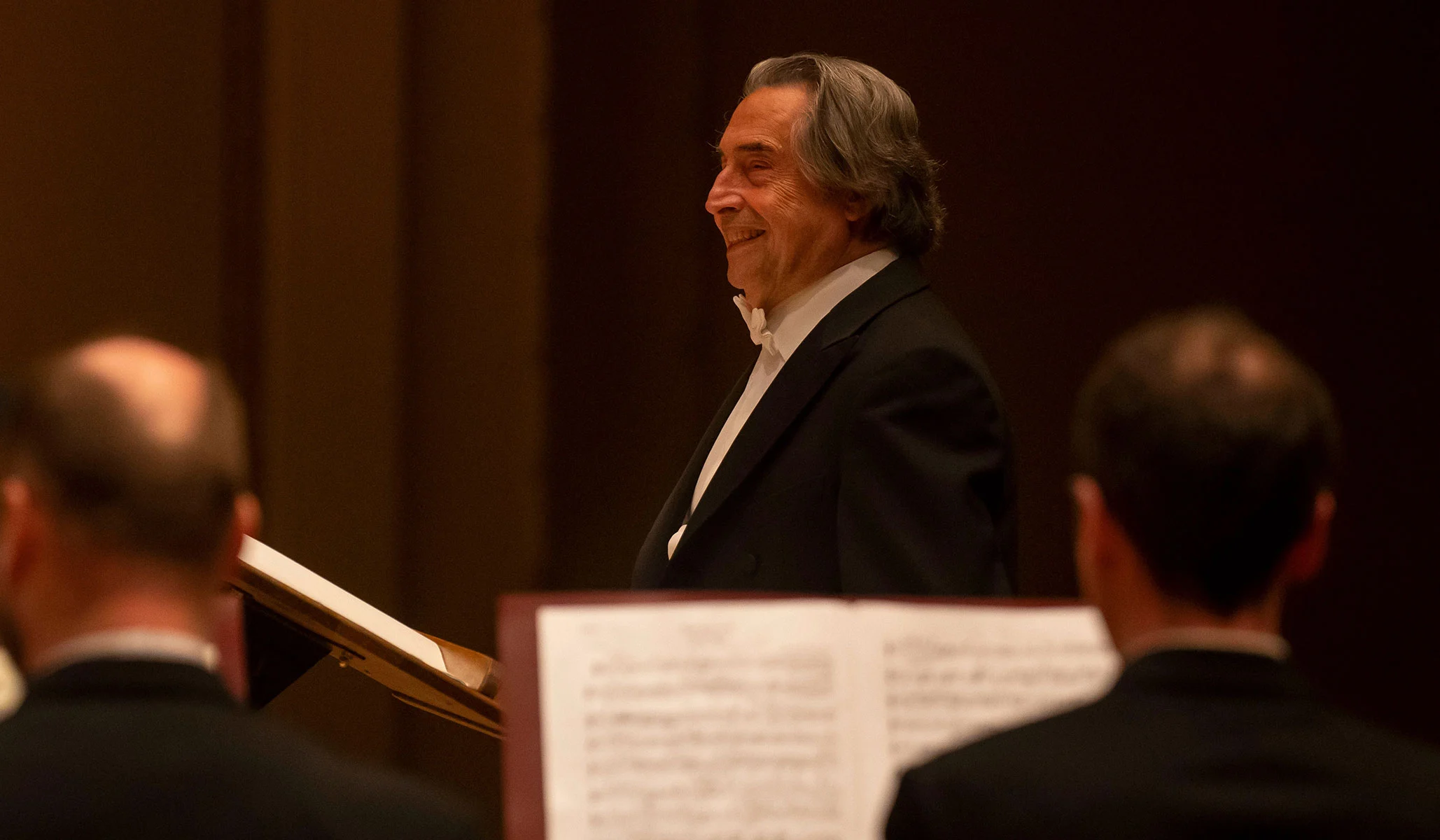Chicago
Riccardo Muti, the renowned conductor, is often the first person that comes to mind when people think of a conductor. He embodies the popular image of a conductor with his demeanor, knowledge, charisma, and longevity. Born in 1941, Muti has conducted orchestras all over the world and has remained consistent in his approach on the podium. I have been following his career since 1980 when he became the music director of the Philadelphia Orchestra.
During those days, the Philadelphia Orchestra had a slogan: “Tutti per Muti,” which means “Everyone for Muti” in Italian. This phrase was printed on T-shirts, coffee mugs, and other merchandise. Although the phrase doesn’t rhyme perfectly in Italian, as Muti himself confirmed, people meant well.
Since 2010, Muti has served as the music director of the Chicago Symphony Orchestra. However, his tenure in Chicago is coming to an end. This doesn’t mean he will never conduct the orchestra again. In fact, he will be conducting them next season, including on the opening night at Carnegie Hall in New York. But he will be stepping down from his role as music director.
After a recent concert in Chicago, I had the opportunity to sit down with Muti in his studio at Orchestra Hall. The walls of the studio are adorned with photos and memorabilia that tell the story of his life.
One of the photos depicts the place in Naples where Muti was born. Another shows Toscanini, the iconic Italian conductor who served as a role model for Muti. There are also pictures of Muti’s beloved teachers, Nino Rota and Antonino Votto. Rota is best known for his music for “The Godfather,” while Votto was Toscanini’s principal assistant at La Scala.
On a table, I noticed a small bust and mentioned Verdi. Muti responded with solemnity, saying, “Always. Always.” Muti has had a deep connection with the composer throughout his career.
Returning to the walls, there is a photo of Muti with Queen Elizabeth II and Prince Philip. The Queen attended a performance at La Scala in 2000 when Muti was the music director there. Instead of Muti going to the royal box, the Queen came to him backstage.
When Muti shared this story with me, I remarked, “The mountain came to Mohammed.” He corrected me, saying, “To the mouse.”
There is also a framed letter from another Mohammed — Muhammad Ali. In the letter, the boxing champion referred to music as “the heartbeat of the universe” and declared that Muti is the greatest, just like him.
Muti commented, “Bellissimo, no? Commovente,” which means “Beautiful, isn’t it? Moving.”
Another moving aspect of Muti’s life is a photo of Castel del Monte in Apulia. This castle, built by King Frederick II in the 1240s, made a lasting impression on a young Muti when he visited it as a child. He has always wanted to buy a piece of land near the castle so he can retire there and gaze upon it. And that is exactly what he has done.
Last season, Muti conducted Philip Glass’ Symphony No. 11. During their conversation, Muti shared his intimate association with Castel del Monte and asked Glass to compose a piece for him to conduct next season. Although Muti hasn’t seen the score yet, he knows that Glass will deliver a piece titled “The Triumph of the Octagon.”
In the recent concert in Chicago, Muti conducted a program that began with Mozart and ended with Respighi’s “Pines of Rome.” Muti quoted Horace, saying, “Alme Sol, possis nihil urbe Roma visere maius,” which translates to “Kind Sun, may you look upon nothing greater than the city of Rome.” He also mentioned a conversation he had with Respighi’s widow, Elsa, who lived until almost her 102nd birthday.
The highlight of the concert was the final section of “Pines of Rome” called “The Pines of the Appian Way.” Muti conducted it brilliantly, even though his gestures were relatively small. According to Muti, conducting this piece only requires beating in four for five minutes. Some conductors use this opportunity to make a show on the podium, but Muti dislikes this approach, likening those conductors to clowns.
Muti pointed out that one of his predecessors in Chicago, Fritz Reiner, was famous for his small gestures, yet he was able to get the most out of the orchestra.
The concert began with Mozart’s divertimento in F major, K. 138, which the composer wrote when he was 16 years old. In our conversation, I recalled a musician who once said, “When I get to heaven, the first thing I’ll ask is, ‘Where’s Mozart?’” Muti has collaborated with many composers throughout his career, but he feels a special connection with Mozart and Verdi. I asked him if he would like to meet them and ask them questions.
Muti responded by saying that he doesn’t think he will meet them because they are in paradise, and he doesn’t believe he will go in that direction. However, he admitted that he would be extremely afraid to ask them a question because if they were to tell him that he got it all wrong, it would be like dying a second time.
According to Muti, Mozart and Verdi are similar in that their operas speak to us about ourselves. They expose our qualities, both good and bad, without passing judgment or wagging a finger at us. They show us who we are, often revealing our flaws.
During our conversation, I mentioned the heavenly trio “Soave sia il vento” from Mozart’s “Così fan tutte.” Muti revealed that he has asked his family to play this trio at his funeral, using a recording conducted by him.
Muti has conducted a significant amount of new music, including American compositions. He pointed out that in Italy, no one pressures conductors to perform new Italian music, and the same goes for Holland and new Dutch music. However, in America, there is a recurring theme suggesting that conductors don’t do enough American music. Muti sees this as a manifestation of an inferiority complex, and he strongly disagrees with it.
To illustrate his point, Muti quoted Robert Schumann, who compared composers to shoemakers. In Mozart’s time, composers made shoes that everyone could wear. In Schumann’s time, they made shoes that only some could wear. Muti then asked, “And how about our own day?” He believes that composers haven’t provided people with enough accessible music that they can warm up to and remember.
When it comes to popular music, Muti finds it increasingly “stupid and superficial.” He believes that modern classical music is often too cerebral and abstract, while pop music is dumb and lacking substance. This leaves the public caught in the middle.
Muti also expressed his dissatisfaction with opera productions. He believes that stage directors often overshadow the operas themselves, creating productions that are at odds with the music, librettos, and stories. He finds it ironic that some people insist on historical accuracy in the pit, using original instruments and adhering to period practices, while anything goes on the stage, no matter how far-fetched.
I mentioned a recent production of Verdi’s “Rigoletto” at the Metropolitan Opera, which was set in 1960s Las Vegas. While it was an interesting and imaginative production, I argued that an opera set in 1960s Las Vegas would be a great idea if someone were to write one specifically for that setting. However, “Rigoletto” is set in 16th-century Mantua, and the Renaissance dance music at the beginning of the opera is meant to reflect the court of that time, not 1960s Las Vegas.
Muti agreed with this point and added that some productions even have Rigoletto portrayed without a hunchback, which is critical to the character and the story. He believes that opera requires the suspension of disbelief, but certain elements must be preserved to maintain the integrity of the story.
Towards the end of our conversation, we discussed the perceived decline in culture. Muti acknowledged that older generations often feel that the society and culture around them are in decline, but he couldn’t help but notice signs of decline himself. He believes that part of the problem lies in the ignorance of the past and our artistic heritage. Muti emphasized the importance of roots, stating, “Without roots, the tree falls.”
Despite these concerns, Muti remains committed to his craft and believes that even small contributions can make a difference. He compared his efforts to fighting a battle, acknowledging that taking the profession seriously can be tormenting. He never approaches the podium thinking about how happy he is to conduct a concert. Instead, he feels the weight of responsibility towards the composer, the music, the orchestra, and the audience. Even after the performance is over, he reflects on all the things he could have done better.
Muti shared a story about Toscanini, who would search through the score of “La traviata” before a rehearsal, even though he had conducted it countless times. Toscanini had known Verdi personally and had worked with him, yet he still sought ways to do the opera justice.
As we wrapped up our conversation, Muti mentioned an upcoming engagement in Vienna where he will conduct the Vienna Philharmonic Orchestra. This is nothing new for Muti, who has conducted the VPO for 53 straight seasons. However, this particular engagement is special because it marks the 200th anniversary of Beethoven’s Ninth Symphony, which premiered in Vienna. Muti feels deeply moved by the fact that they chose an Italian conductor instead of an Austrian or German for this significant occasion. He believes that music transcends nationality.
In the end, Muti’s dedication to his profession and his desire to preserve and promote great music shines through. He understands the challenges and complexities of the music world but remains committed to making a positive impact, one performance at a time.

